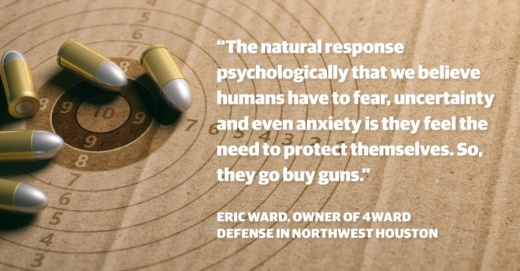“You have a combination of several things happening right now, and it’s really creating a perfect storm. It started with COVID-19 back in late February, early March,” Ward said. “The natural response psychologically that we believe humans have to fear, uncertainty and even anxiety is they feel the need to protect themselves. So they go buy guns.”
Nearly 26.7 million firearm background checks were conducted across the U.S. from March through October—up from 18.6 million during the same time frame in 2019, according to the National Instant Criminal Background Check System. In addition to responding to the COVID-19 pandemic, Ward said it is typical for gun sales to increase during a presidential election.
“This feels like the most polarizing election I’ve experienced in recent years,” he said. “We had different flavors of social unrest across the summer from different events that have occurred. ... We’ve had chaos, social unrest, destruction of property and unfortunately loss of lives. And I think that scares people.”
Ward said regardless of who wins the presidential election, he expects to see continued demand for firearms and ammunition.
If President Donald Trump is re-elected, he said he anticipates “more of the same” as the COVID-19 pandemic continues. If former Vice President Joe Biden claims victory, Ward said many people would look to make purchases out of fear of tighter gun restrictions in the future.
According to his official campaign website, if elected, Biden promises to require background checks for all gun sales, end the online sale of firearms and ammunition, regulate the possession of existing assault weapons, and ban the manufacture and sale of assault weapons and high-capacity magazines. The plan mentions a National Vital Statistics Report that said 40,000 people die from firearm injuries annually.
“When people start getting worried about these types of things, there is a massive and immediate onslaught in the market to buy everything someone possibly can,” Ward said. “The only thing that we can comfortably say is truly going to happen—there’s going to be chaos and unrest ... regardless of who wins.”
Supply and demand
People are buying more firearms than ever before to protect themselves, Ward said. While many of these individuals previously owned guns, ammunition and other related accessories, he said the biggest trend he has seen in his business is first-time gun owners.
“We have had a dramatic increase in what we call new shooters—people who are like, ‘I have no idea what I’m doing. I’m here because, for whatever reason, I’m scared of something, and I feel the need to learn this skill set,’” he said.
Some experts have estimated the demand-supply ratio for common firearms such as the Glock 19 is around 12 to 1, Ward said. But the high demand among first-time gun owners especially has affected the market’s supply because they also have to purchase magazines, cleaning supplies, safe storage equipment and ammunition.
On top of this, the COVID-19 pandemic has put new restrictions on the manufacturing process such as limiting the number of people who can work at any given time to produce new merchandise, according to Ward.
Ward said it is important to remember purchasing a gun does not guarantee safety. He encourages people to seek out proper training and to ensure firearms are secure from children and other individuals who should not have access to them.
“I wouldn’t just leave something sharp or dangerous or flammable where my child can grab it,” he said. “Treat your firearms the same way you treat all of these other things that have the potential to harm you.”





